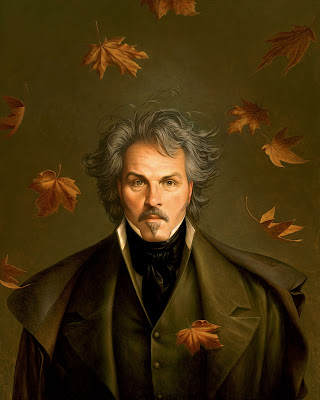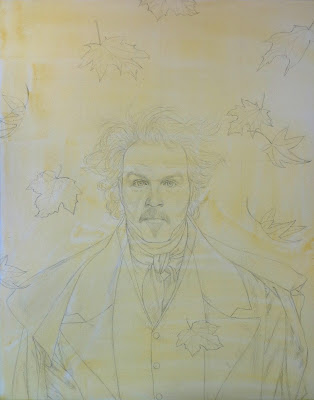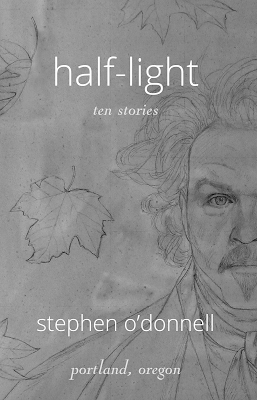The first thing I want to say about designing the cover for Stephen O'Donnell's short story collection Half-Light is that it was a complete collaboration. All my designwork is a collaboration of some sort, of course, but in this instance it was really the two of us working side by side at every step.
Especially since the natural direction was to use his own artwork. Fine art is what he's known for, of course, and, well, how could we not, when we had this embarrassment of riches, and more, laid at our feet?
So much beauty for the picking. We only had to pick.
That was harder than you might think. Stephen's writing comes from a very different place than his painting. Here's Stephen from the afterword of the book:
I’ve joked, while putting together this collection, calling this the most depressing little book ever. But, honestly, to me it isn’t actually depressing. Because, as someone always searching out beauty, I recognize it in so many, often unexpected, forms. Because beauty isn’t always pretty. Often it’s sad and lost. That’s what I find I’m compelled to write about, that’s what is there inside me.
So yes, we should use his art to adorn the cover, but what painting could fit these beautifully "sad and lost" stories? The monkey wearing the pearl necklace? The drag Belle Époque self-portrait with the squirrels crawling all over his elaborate up-do?
The one piece I thought of immediately was Autumn into Winter.
It's magnificently somber, quiet, introspective. Not only does the tone fit, but a detail from this piece accompanied one of his short stories, "From the Streetcar," when it was published previously in Nailed Magazine.
But Stephen didn't really like this idea. It felt like too much him. I got that, so we sat down at his computer and went through his image files of his paintings together, looking for anything that might fit. Maybe a painting that featured a book or books in some way. Maybe a painting whose subject had some connection to the elements in his stories.
We were getting pretty discouraged when we discovered a folder that had Autumn into Winter, but not the completed painting: rather, a photographed work in progress. His pencil sketch with a wash of yellow paint on top, which is Stephen's first step in beginning the painting process.
Seeing that image was one of those moments. I looked at him and he looked at me, and we knew we had it. It gave us the mood we wanted but without Stephen's image being quite so up close and personal. There was also plenty of room to add text and not so much detail that that text would get lost. It was perfect. Well, near perfect.
I said at the start of this post that the design work for the cover was as much Stephen as me, and one way he really got involved was in putting his artist eye to our chosen artwork to make it perfect. He took the piece into Paint Shop Pro and adjusted the color, saturation, and tone until he had a few versions that he really liked. Then he passed them back to me to lay down the text.
He wanted something simple and elegant for that. I made him some samples.
Once he chose the layout he liked best, we tinkered with the font color for the yellow in "ten stories," down to the most incremental adjustments in shade, until it was exactly what he wanted.
OK, in the end we did one print run and then went back to the drawing board to update the artwork color again. The original final was yellower, and Stephen decided, once he'd seen it in print, that he wanted something less bright. The above is our final-final.
The Half-Light project gave me the chance to design not only the cover but the interior as well, and when you have your fingers in the whole of a book, design-wise, it can be a special thing. It lends a cohesion to the book and it lets you add extra details. It was fun to take the artwork and type treatment from the cover and apply it to our title page.
Half-Light is out now. It can be found at Powell's Books, or ordered directly from Stephen through his website.
And psst. Now that the collection is finished and out in the world, Stephen is working on what he says he thinks might be a novel.
For a taste of Half-Light, here's an extract from his short story "The Leaves at the Top," which is set during the Depression.
There were men, too, men by themselves, who sometimes gave her rides. Men who gave her some money when they were done with her. One middle aged man, bald and pale, said he couldn't pay her after he'd said he would, after he'd done what she said he could. Said he'd lied about having it. She hauled off and bloodied his nose, before she grabbed her valise and slammed the car door behind her. He was so shocked, her standing at the side of the road cussing him up and down, that he just sat there, the motor running, blood running into his wide open mouth, before he slammed the car into gear and tore off.
Since she was eight years old—almost half her life—she had been learning what men were, what they wanted. And what they didn't care about. Who they never cared about. They didn't care, so neither did she. She wasn't afraid of men. And that's why she could laugh if off that way. Laugh that some boy would think that she would be too afraid, too dumb, that she would let him do it to her. Do it for nothing. That's why she could lie there after that. Lie there in the shade of a huge eucalyptus tree, in the warm of a fine California afternoon. She could breathe in the strange gray green smell of the tree, look up into the highest branches, the turning gray green leaves that disappeared into the color of the sky. And let herself think of nothing.












No comments:
Post a Comment